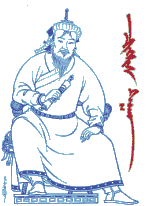 |
 |
 |
 |
|
Is
Genghis Khan partly responsible for Mongolians' political culture
today?
|
Another 195 Mongolians were
asked in a second round of interviews, 'Do you agree that in some
sense there were democratic principles practiced in the time of Genghis
Khan?' Two hundred eight (61.9 percent) said yes; 63 (18.8 percent)
said no; and 65 (19.3 percent) said they do not know. Then they were
asked, 'What democratic principles could be borrowed from Genghis
Khan's time for use today?' Their answers are in the following table:
|
| Mongolians today believe Genghis
Khan practiced basic democratic principles. |
Precondition:
· Genghis Khan united different peoples into one independent
nation. |
| Principles
of Democracy |
Perceptions
of Genghis Khan |
| Participatory
government |
Participatory democracy existed in the Wise Men's
Council and Great Assembly.
The state was strong in reputation, responsibility,
power and influence.
|
| Rule by
law |
Rule by law prevailed.
Laws/legal system were just, fair, and applied to
all.
People revered, respected, and obeyed the government
and its laws.
|
| Equality
under the law |
All were equal before the law.
Leadership (Genghis Khan) was strong, wise, and
caring.
|
| Human rights/personal
freedoms |
Personal freedoms (speech, religion), pluralism,
and human rights were honored.
The free market principle controlled the economy.
|
| 195 people interviewed in
Hovd and Ulaanbaatar, August 1998. |
| The first principle of democracy
is participatory governance. The table illustrates the point that
even if participatory governance takes different forms in each century,
the basic principle is present in both cases. |
| The second principle of democracy
is rule by law. This principle was the one mentioned most frequently.
|
| Equality under the law, the third
principle, may have been honored in the breach more often in Genghis
Khan's time than it is today, but he did institutionalize the concept. |
| The fourth principle is government
protection of human rights and personal freedoms. Mongolians are well
aware that Genghis Khan advocated some but not all of the personal
freedoms considered pivotal to democratic government: free speech
and religious tolerance stand out. To expect a person of the 13th
century to think as people in the 21st century do would be unfair.
|
| Based on the evidence presented,
it appears that Genghis Khan, or at the very least the people's ideal
of Genghis Khan, forms the basis for a political culture that greatly
favors independence and democracy. Indeed, he is clearly an inspiration
for Mongolians' embrace of the four principles of modern democracy.
|




